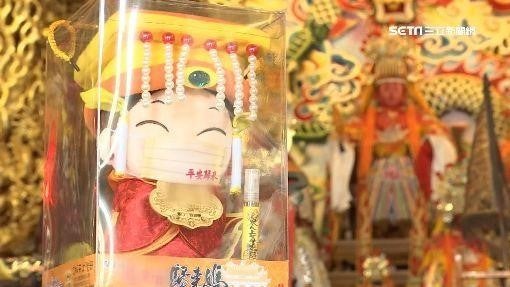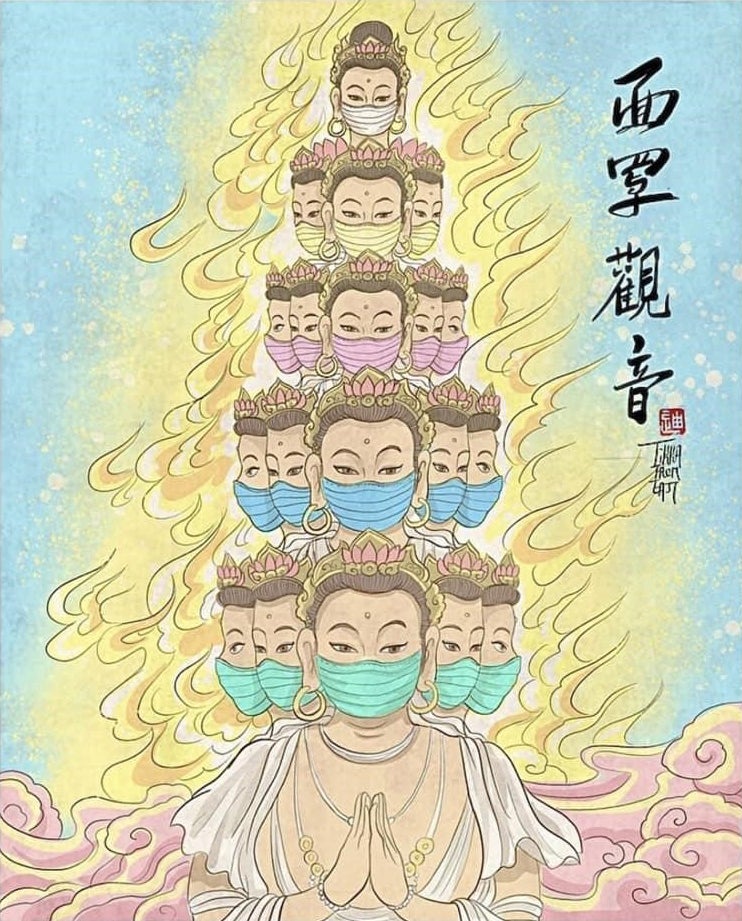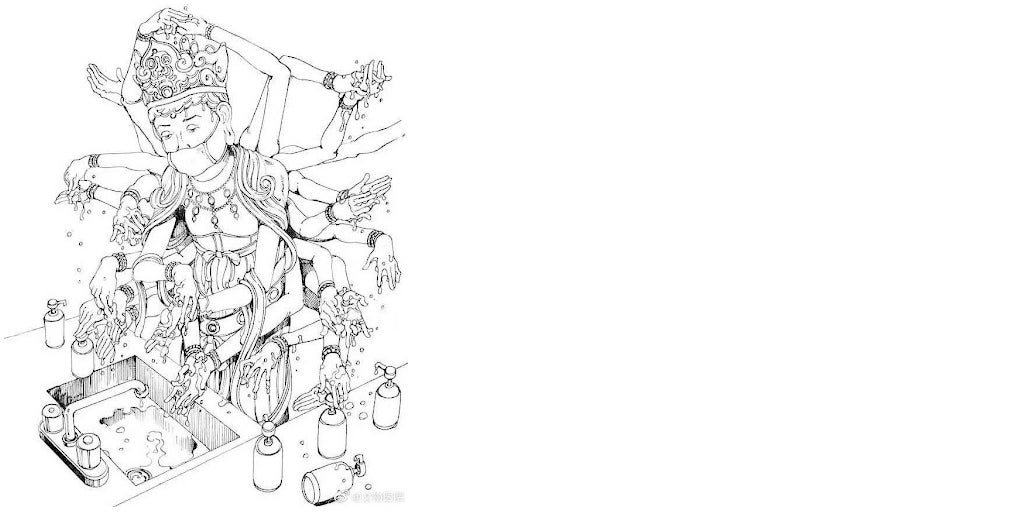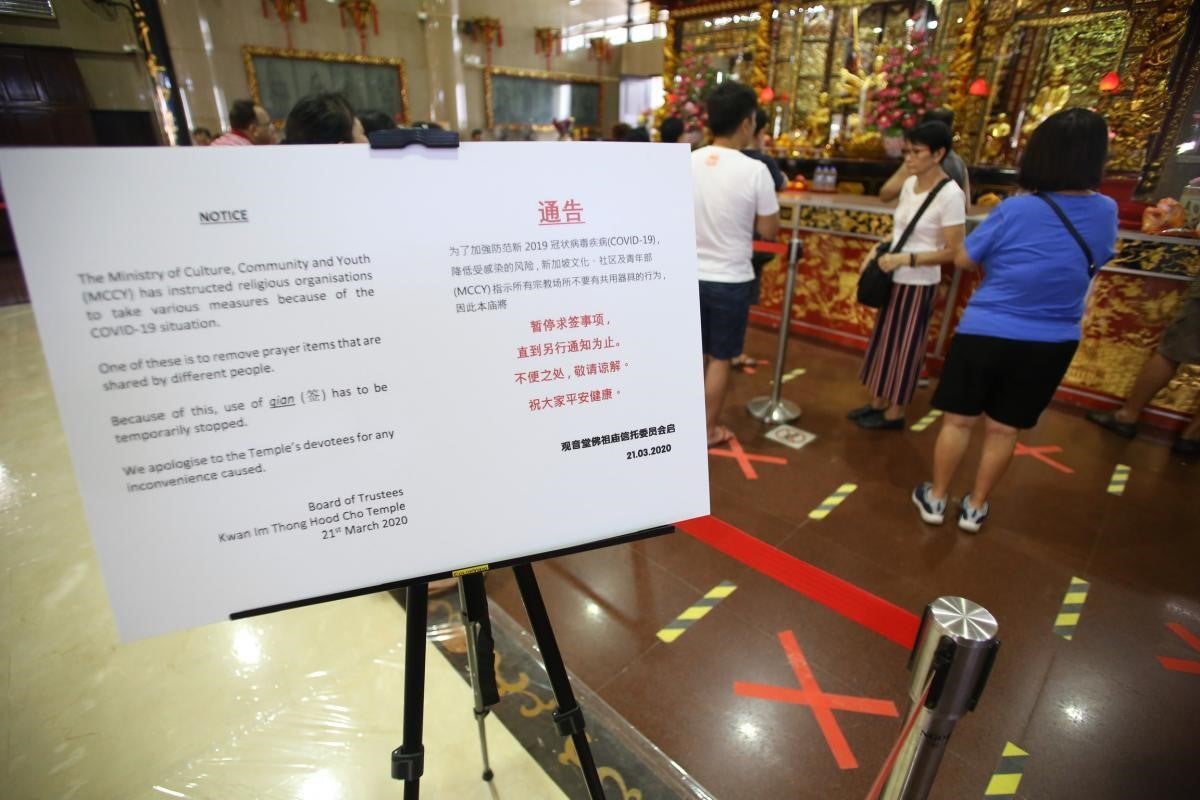Why Was Thousand-hand Guanyin Late for the Meeting? Implications of Religious Humour During COVID19
contributed by Dean WANG, 18 June 2020
Humour serves to release tension while religion renders emotional support. The global pandemic COVID19 puts to test not only the current state of medical sciences and government effectiveness, but also the devotion towards one’s faith. The closure of places of worship and mandatory suspension of religious activities do not put religiosity to a stop, as various online platforms have allowed one to continue to do religion under the new normal. I will focus on the graphics and memes that are related to the Asian religious traditions to discuss the online reception of COVID19 graphics and memes that feature religious humour, and their broader implications to the sociology of religion. For related discussion on Christianity, see David Morgan, “Religion and Humor in the Time of Pandemic”.
Religious Memes and Jokes on COVID19
Figure 1, which was created by the famous Taiwanese author Banaishunzi (pseudonym), was widely circulated across several social media platforms around early March 2020. The meme depicts the “Heavenly Pandemic Prevention Meeting,” with a conversation as follows:
Jade Emperor: Why have I not seen the Thousand-hand Guanyin for quite some time?
Gods: Because she is still washing her hands!
Jade Emperor: What about the Four-faced Buddha?
Gods: He is short of a mask, since we are only allowed to redeem three pieces per week!

Figure 1: COVID19 religious meme on hand-washing and mask-wearing by Banaishunzi
Certainly, gods and bodhisattvas, or for that matter all supernatural beings are immunized against pandemics and exempted from such restrictions implemented by the government. The secular depiction of sacred beings, however, served to highlight aspects of their humanity – defined as being compassionate and sympathetic, as well as having the quality or state of being human. “Even the gods are doing it! What excuses do you have?” commented a Facebook user who shared the original post.
This meme has inspired a more elaborated joke along the same line:
Jade Emperor: Why is the Medicine Buddha (Yaoshi Fo) not here?
Gods: The pharmacists (yaoshi) are busy selling masks!
Jade Emperor: What about the Eight Immortals?
Gods: They are placed on the Home Quarantine Order as they had just come back from overseas!
Jade Emperor: What about Sage Lord Guan?
Gods: His face is burning-red and he is running a high fever of more than 37.5 degree Celsius, so he is observing self-quarantine at home!
Jade Emperor: Why is Tripitaka also not here?
Gods: He is also placed on the Home Quarantine Order as he has a travel history!
Jade Emperor: Why is Mazu not here?
Gods: Her devotees do not maintain the two-meter social distancing rule, so Mazu cannot leave her house!
Syncretism is not only reflected in the integration of Daoist and Buddhist divinities (a characteristic typical of Chinese popular religion), but also in the weaving of secular issues and sacred references into one cultural fabric. Each line in the above joke highlights a unique characteristic of the god mentioned, associating it to an epidemic prevention policy implemented in Taiwan. Although the measures that involve the Medicine Buddha and Mazu have to be understood in the local religious context, the measures related to the other gods are easily relatable around the globe.
Reading Mazu Meme in Context
The part on Mazu in the above joke refers to the postponement of the largest annual religious procession in Taiwan, i.e. the Dajia Mazu Pilgrimage, which was originally scheduled for 19-28 March. The Chairman of Jenn Lann Temple was initially determined to carry on with the procession as planned, in spite of the calls from medical experts and general public to cancel it, as he believed that “Mazu and the Jade Emperor will cooperate and stamp out the epidemic in Taiwan and the world.” This saga inspired another meme (Figure 2), which calls out for the devotees to adhere to socially-responsible and rational behaviour of wearing a mask.

Figure 2: COVID19 religious meme on “Mazu Wearing Mask”
“Mazu Wearing Mask” was later recreated as a plush toy by Citian Gong, a Mazu temple located in Taiwan’s Pingtung county (Figure 3).

Figure 3: “Mazu Wearing Mask” plush toy designed by Citian Gong (Source: Yahoo News)
Religious Graphics on COVID19
The month of March has also witnessed the flowering of other related artistic graphics creation, such as the two paintings of Guanyin in Figures 4 & 5 by Hong Kong artist “Tik Ka from East,” and two other similar paintings of Guanyin (Figure 6) and Shiva (Figure 7) by unknown artists.

Figure 4: “Face Mask Guanyin” designed by Tik Ka from East

Figure 5: “Washing-hands Guanyin” designed by Tik Ka from East

Figure 6: Artwork depicting Guanyin washing hands. Artist unknown

Figure 7: Artwork depicting Shiva washing hands. Artist unknown
The memes and graphics of the Thousand-hand Guanyin resonate on the irony that the “Thousand Hands and Thousand Arms” manifestation of the bodhisattva of compassion was to reach out to all who are suffering, but whose efficacy is now restricted by the worldly restrictions and precautionary measures.
Jokes aside and returning to Singapore, the famous Guanyin temple located at Waterloo Street – Kwan Im Thong Hood Cho Temple – announced on 21 March that the ritual of divination lots drawing will be temporarily suspended in order to limit contact among devotees. Divination lots serve as a medium of communication between the devotee and the god by facilitating future prediction and providing psychological counseling without self-disclosure (Jia Wen Hing 2016).

Figure 8: The temple’s notice on the suspension of divination lots drawing. Crosses and demarcations on the floor show implementation of the safe-distancing measures (Source: Lianhe Zaobao)
Due to the worsening of the local COVID19 situation, the temple officially announced its temporary closure for the first time ever since its founding in the 1880s, from 27 March till further notice. All these, however, do not stop the devotees from praying outside the temple gates or turning to the online version of Guanyin’s divination lots.
Ultimately, COVID19 has taught us that it is not about how the gods can save us (giving a man a fish), but how we can save ourselves by applying religious thoughts, values, and practices (teaching a man to fish) in our everyday life.
References
Jia Wen Hing, “Chinese Gods now speak English: Translation and religiosity in Singapore.” Paper presentation, 7th Asian Translation Traditions conference, Monash University, Malaysia, September 2016.
Dean Wang is a consultant at W&H Research Consultancy. He has recently completed his PhD dissertation on the worship of underworld gods in Singapore. Dean specializes in the research of Chinese religion, interfaith studies, and popular culture. He is currently researching on local Hainanese Daoist altars in Singapore.
Disclaimer: The views and opinions expressed in this article are those of the authors and do not necessarily reflect the position of the blog editorial team or the Asia Research Institute.
South Asia | Southeast Asia | East Asia | Other Places | Hinduism | Buddhism | Islam | Christianity | Other Religions

